 78
78
In Germany, the recycling rate of plastic bottles can be as high as 90%. Today, on social platforms at home and abroad, you can often see everyone sharing their daily routine of "picking up bottles" in Germany: Young people are busy collecting empty cups after concerts and music festivals, residents line up in front of the bottle Return machine at the supermarket door with bags of empty bottles, and recycling plastic bottles has become a local habit, and these can not be without an important mechanism - Deposit Return System (DRS).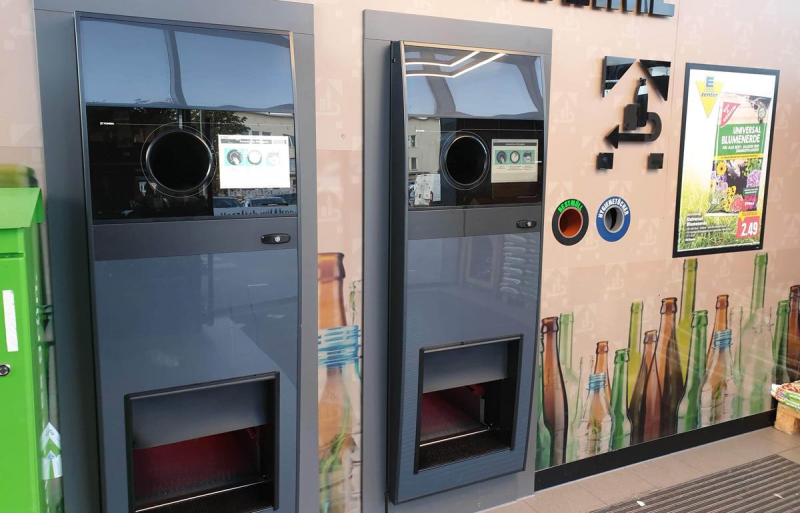 German bottle self-recycling machine (Pfandautomat)
German bottle self-recycling machine (Pfandautomat)
Since 2003, Germany has decided to fully charge beverage bottle deposit (Kaution), in more than a decade to establish a perfect recycling system, when residents buy drinks, will be automatically charged the corresponding deposit (Pfand), each bottle has a deposit, will be returned after the bottle.
These bottles with deposits can be divided into two main types, single-use bottles (Einweg), which are broken down into basic raw materials such as plastic pellets or metal sheets for reprocessing into other products, and reusable bottles (Mehrweg), which are used multiple times after cleaning, such as glass beer bottles.
The deposit for reusable bottles is between 0.08 euros and 0.15 euros, while the deposit for disposable bottles is usually 0.25 euros, which is equivalent to about 2 yuan. If you collect and return 100 disposable plastic bottles every day, your monthly income can increase by 6,000 yuan, so "making money by picking up bottles" may not be just a joke.
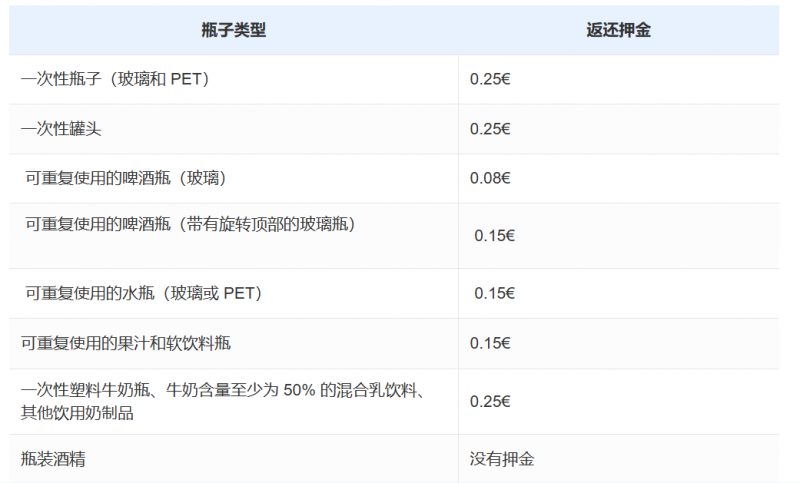 German beverage container deposit price
German beverage container deposit price
Not only in Germany, the system has been widely used around the world. According to the European environmental agency Reloop's "Global Deposit Book 2022" (Global Deposit Book 2022), there are currently more than 50 different "deposit systems" in the world, and the recycling rate of beverage containers can reach 76% on average, and it is expected that by the end of 2026, Some 748 million people will live in "deposit" countries or territories. This system is especially effective in the recycling of beverage bottles and food packaging. How does it start from beverage bottles and extend step by step to catering, take-out and other industries, and even leverage the entire packaging market? 1 From disposable plastic bottles: The rise of the "deposit system" The earliest "deposit system" can be traced back to the 20th century, manufacturers to reduce the production cost of bottles, to avoid waste of resources. In 1970, the Canadian province of British Columbia implemented the first legally binding deposit system, with early adoption of smaller deposits, limited recycling materials, and fixed collection locations. In the 1980s, as the concept spread to Europe, especially in Norway and Sweden and other "environmental pioneers" in the Nordic countries, the "deposit system" has been promoted nationwide, gradually evolved to accept a wider range of packaging materials and higher deposits, usually using the store as the recycling point of the "point return" model, that is, directly in the store where the drink is purchased for recycling. And so far, European and American countries are mainly used to deal with the increase in disposable plastic pollution year by year. Stores practice the "deposit system" has also brought more economic benefits to the store, businesses in the store placed automatic recycling machines, virtually guide consumers to return disposable plastic bottles more frequently to the store, creating more opportunities for offline shopping, playing a continuous role in stimulating consumption. In our country, the deposit system has appeared in recent years. The Hong Kong Environmental Protection Department (EPD) launched the "Bottle Feeder Pilot Scheme" (Bottle feeder, that is, bottle recycling machine) in the first quarter of 2021. According to the official website of the Environmental Protection Department, as of the end of October this year, 120 "bottle filling machines" have been deployed in Hong Kong, and more than 138 million plastic bottles have been recycled. In the recycling of single-use plastic bottles, the advantage of the "deposit system" is that it can better mobilize the participation of local residents in environmental protection, so as to significantly improve the recycling rate, but from the actual situation, it has its limitations. Taking Germany's "deposit system" as an example, recycled disposable beverage bottles are usually processed through the "dual-track recycling system (DSD)" in collaboration with the public and private sectors, and most bottles can only be processed into low-grade products, such as plastic pipes, garbage bags and express packaging, due to material and hygiene requirements after recycling. Although this "degradation cycle" model extends the life cycle of plastics, it cannot form multiple cycles and cannot fundamentally solve the more serious plastic pollution problem. 3 New business wave in the catering industry: "reuse + deposit" model in contrast, the "reuse + deposit system" model that is gradually popular in the catering and take-out industry can achieve "peer cycle". The core of the "Reuse model" (hereinafter referred to as the "reuse model") is the use of reusable food boxes, drink cups and other containers instead of single-use packaging. These reusable containers will be returned to the recycling system after consumer use for cleaning, disinfection, and reuse, forming a closed loop of use, not only reducing the use of single-use plastic, but also reducing raw material consumption and waste disposal costs. Also in Hong Kong, there is a typical commercial sample of the "reuse + deposit" model. In 2022, the international delivery platform Foodpanda jointly with the World Wide Fund for Nature Hong Kong (WWF) launched the "reusable lunch box Program" in Hong Kong, according to its official show that as of July 2024, 60 restaurants have participated in its partners, anda total of about 20,000 orders have been completed. Delivered more than 27,000 reusable lunch boxes.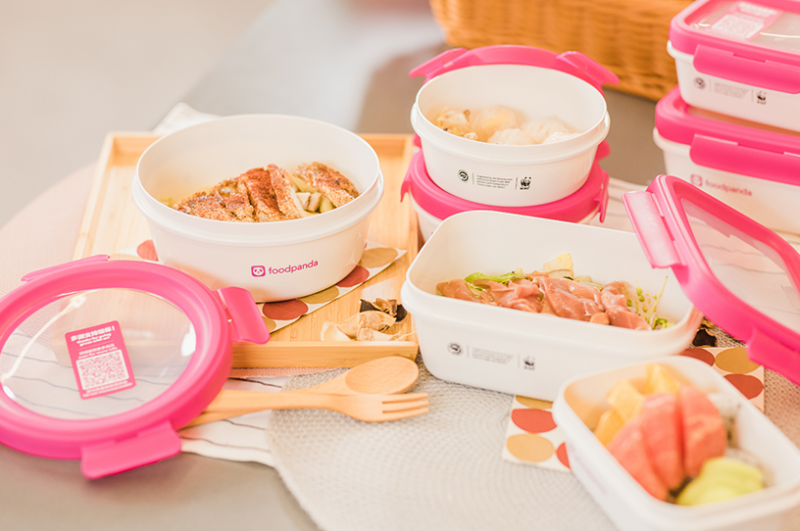 Reusable takeaway cutlery from Foodpanda
Reusable takeaway cutlery from Foodpanda
Consumers can choose the "reusable food box" on the Foodpanda platform with a HK $10 deposit, which can be returned to the container recycling machine or delivered to the delivery person after the meal is finished. When you get your deposit back, you can get a HK $15 foodpanda e-coupon for each container returned, as well as benefits such as free travel, green points and eco-friendly products provided by relevant partners such as MTR Corporation Limited.
Through the simple form of "return is profit", the "reuse + deposit" model actually provides residents with a concrete way to participate in environmental protection in daily consumption, environmental protection is not an abstract and distant concept, but a good experience, bring real returns.
The smooth operation of the deposit system is also dependent on a key policy measure, the Extended Producer Responsibility (EPR), the core idea of the EPR is to extend the responsibility of producers for their products from the production stage to the entire life cycle of the product. Including design, production, circulation, consumption and other links, especially recycling and waste disposal.
In Germany, the local EPR system requires beverage manufacturers to ensure that the recovery rate of their bottled beverages meets a certain standard, and if they fail to meet the standard, they will have to pay fines or invest more resources to improve the recovery rate, so manufacturers need to consider recyclability when designing packaging and material selection. The role of the "deposit system" is more reflected in the consumption level, promoting the return of packaging and containers by the public, and finally producing good recycling effects through the collaboration of the two.
4
Will the "deposit system" be the next stop for China's environmental protection?
Glass bottles, also used to be one of the highest recycling rates in China. Many people born in the 80s and 90s May still remember that when they went to the grocery store to buy soda, they needed to put 50 cents or a dollar on the glass bottle. This is also a simple "deposit system" in the early days of China, mainly because raw materials were scarce at that time, and there was no unplanned market, and manufacturers could only recycle beverage bottles and reuse them after cleaning to ensure market demand for beverage supply. However, with the development of The Times, the supply of beverage packaging raw materials is more adequate, coupled with the change of consumption patterns, the gradual increase in recycling costs and other factors, China's bottle recycling has also ushered in more challenges.
In recent years, some well-known global enterprises have also begun to pay attention to the "reuse + deposit" model, in the long-term brand value and future market share to make layout, for example, starting from 2021, Starbucks began to pilot the "Borrow A Cup" (Borrow A Cup) program worldwide, of which Taiwan Starbucks has been in December 2022. The revolving cup service was piloted in 60 stores in Taipei and Taoyuan with a NT $50 deposit for each cup and a NT $10 drink coupon upon return, reducing the number of disposable cups by more than 22,000 as of August 2023. While such corporate-led pilot projects have had some success in increasing container recycling rates and consumer engagement, they still face challenges such as consumer health and safety concerns, limited roll-out scale, and high initial costs.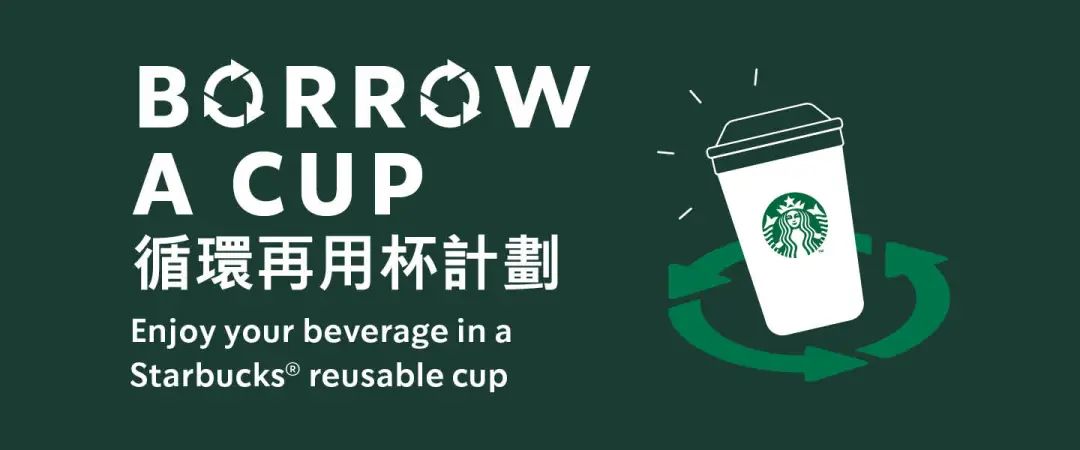
Starbucks' "recycle cup" program
Photo | Starbucks HK
If the recycling system needs to be implemented on a large scale, it cannot be separated from systematic policy support, and the government plays a key role in this link. Experience in countries such as Germany and Sweden has shown that system operators with regulatory functions are essential as the central bridge between producers, consumers, recyclers and users.
In recent years, more and more experts and scholars have begun to pay attention to the role of EPR system in environmental protection and corporate responsibility. Zhao Kai, executive vice president of the China Circular Economy Association, has mentioned that although China still has problems such as low recycling rate and excessive packaging in the recycling of outer packaging, and the recycling system is not perfect. Promoting EPR legislation, clarifying specific recycling targets, and refining them to local and corporate levels will help improve the level of recycling of packaging waste. In addition, Chang Xinjie, chairman of the Environmental Working Group of the European Union Chamber of Commerce in China, also said that the EPR system can better help balance the cost burden of enterprises in environmental protection, so that all kinds of enterprises are at the same starting line in environmental protection costs, so as to reduce the cost difference caused by different packaging materials, so that enterprises are more motivated to jointly promote the efficient recovery and recycling of packaging waste.
In general, in the policy design, policy makers should fully consider the combination of "deposit system" and "EPR system", in the catering, takeout and other heavy plastic packaging industry clear "reusable" goal, if only focus on recycling and neglect reuse, may lead to a large number of plastic bottles recycled only for the production of low-quality products. In recent years, the rapidly developing degradable plastics are still disposable linear economy, and the plastic reduction effect has not met expectations.
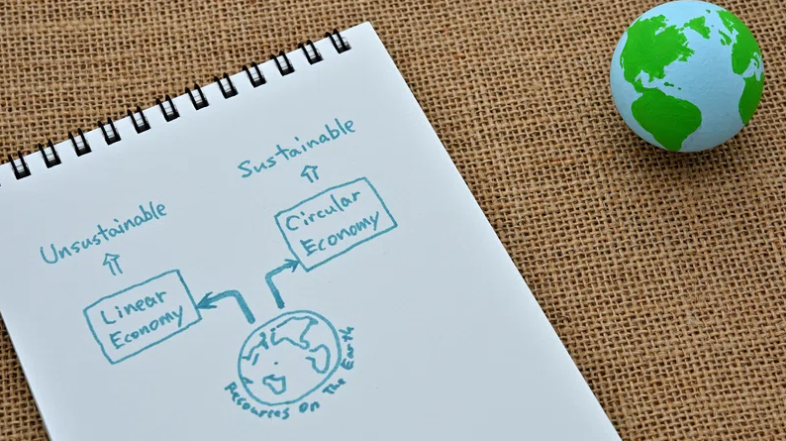
Linear economy and circular economy
See |UE official website
With the deepening of the country's understanding of circular economy and green economy, as well as the continuous advancement of public demand and enterprise development, the initial consensus and basic conditions of "recycling - recycling - reuse" have gradually formed in China. It can be said that the "deposit system" will be expected to lead China out of the predicament of beverage bottle recycling, and become an important part of China's exploration of the reuse model as the core of the packaging plastic reduction road.


